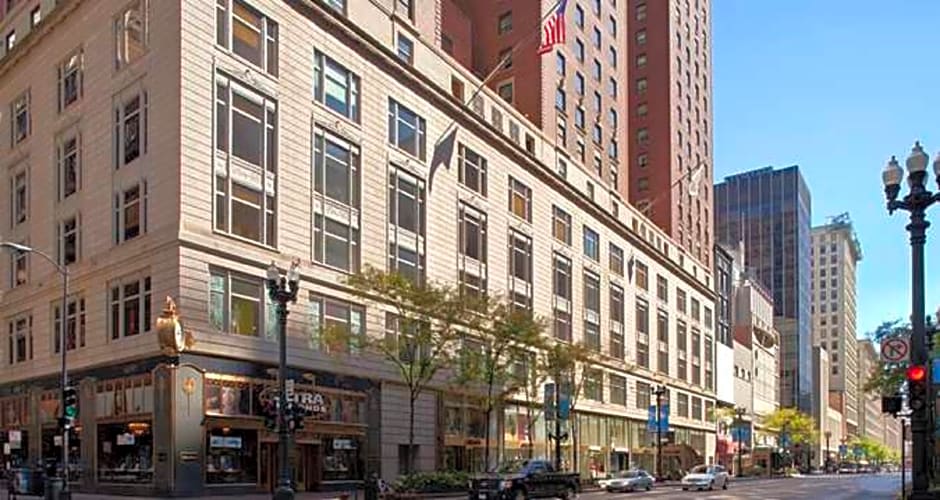 |
| Palmer House Hilton, site of the Midwest Political Science Association conference |
Policies adopted by local governments directly impact the inclusion of immigrants into political life, according to a paper by Samantha Chapa, a Ph.D. student in political science at the University of Houston, presented at the 2023 meeting of the Midwest Political Science Association. Ms. Chapa analyzed 31 policy choices of various cities, and found mixed but positive impacts on first and second generation immigrant participation in the 2020 general elections. She argued that pro-inclusion policies can provide both resource effects (e.g. jobs/employment) and interpretive effects (e.g. communicating a sense of welcome), both of which increase community ties for newcomers.
 |
| Samantha Chapa (from uh.edu) |
Her work is pertinent in this era of increased diversity and attention to immigration, and the expectation that these will only increase with future economic and environmental developments (See Steuteville 2021). Most places in America today reflect a historically white majority in their political and economic power structure. Some of our most diverse cities are also the most stratified--Washington, D.C., for example, where the median wealth of white families is something like 50 times that of black families. These cities can choose to try to maintain or broaden the voices in their community. (They can also try to be an enclave or a fortress, but let's not go there.)
Samantha Chapa commended the work of Welcoming America, a Georgia-based organization that advocates "inclusive communities becoming more prosperous by ensuring everyone belongs." They go on:
Whether it's due to the economy, immigration policies, or climate disasters, communities experiencing an influx of newcomers may not be prepared, causing misunderstanding and tension, and in some cases, outright violence and hostility. But when communities recognize the value [in] being truly welcoming and intentionally work toward the inclusion of newcomers, they can create a culture and policy environment where all residents feel empowered to work with each other in strengthening the social, civic, and economic fabric. When we find strength in our diversity--and actively resist fear and division--we can build a resilient community that fully harnesses the talents, skills, and contributions of every resident so that all can thrive.
 |
| Source: welcomingamerica.org |
In other words, you can spend scarce resources keeping newcomers down and out, or you can work with them to build strong resilient places--a point I've made here, more than once. Welcoming America's Welcoming Standard includes seven goals, including attention to "leadership and democratic spaces," full use of the education system, leveraging all talents in the local economy, and diversity training of public safety staff.
That genuine inclusion requires more than merely ending policies of exclusion was shown the following night at the Gene Siskel Film Center, mere blocks from the site of the MPSA conference. The Australian documentary film "You Can Go Now" highlighted the struggles of aboriginal peoples after generations of usurpation and exclusion.
 |
| Artist and activist Richard Bell, portrayed in "You Can Go Now," speaks to the audience after the film |
One longtime activist stated towards the end of the film that there had been genuine legislative progress, particularly during the administration of Prime Minister Paul Keating (1991-1996), but that now many conditions were worse than ever for aboriginals. It's one thing to change laws, and by no means a small thing; but it's quite another matter to address socially ingrained alienation, suspicion, fear, and concentrated poverty.
Other papers on the MPSA's Race and Local Politics panel--held Friday morning at 8, but well worth getting up for!--explored areas of local government policy where cities could opt (or not) for inclusion. Aliyah Jenille Mcilwain of Michigan State University found that support among long-time black residents of Detroit was not as high as one might expect for a state project to replace I-375 with a more urban-style development. I-375 when constructed displaced 130,000 mostly minority residents; maybe current residents see the new project as another chapter in policies being imposed upon them from outside? This is a widespread problem with planning and land use policy making, documented in a new study by the Urban Institute (Lo, Noble and Freemark 2023).
Gustavo Francisco Novoa of Columbia University and E. Grant Baldwin of UCLA (with three co-authors) looked at districting for city council elections. Most local government use at-large elections, with 8 percent (including Chicago) using districts and 9 percent (including Cedar Rapids and Washington, D.C.) using a mix of at-large and district seats. Nonwhite representation on city councils increases with the use of districts, but as Novoa showed with a Monte Carlo simulation, a lot depends on how local governments choose to draw the districts.
Which is pretty much where those of us with some power and privilege stand now: a choice of how we're going to face the future. Competitively or cooperatively? Inclusively or exclusively? Sustainably or exploitatively? For the time being at least, the choice is ours.
PAPERS CITED
E. Grant Baldwin, Dan Butler, Adam Michael Dynes, and Michelle Torres, "At-Large Elections and Descriptive Representation in U.S. Municipalities"
Samantha Chapa, "Inclusion and Participation: How Local Policy Affects Political Participation"
Aliyah Jenille McIlwain, "Reconstructive Reparations? A Survey of Government Performance and Perceptions in Southeastern Michigan"
Gustavo Francisco Novoa, "Coloring in the Lines: The Determinants of Majority Minority Districts and Descriptive Representation in U.S. City Councils"
Other panel participants were Athena M. King and Paru Shah.
SEE ALSO:
"The Neighboring Movement Comes to Cedar Rapids," 19 July 2022
"Can Cedar Rapids Be a 'Receiver City?'" 28 December 2021




No comments:
Post a Comment